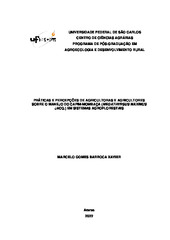Práticas e percepções de agricultoras e agricultores sobre o manejo do capim-mombaça (Megathyrsus maximus) em sistemas agroflorestais
Abstract
Anchored in the practices and knowledge of traditional peoples and communities, and in the dialogue of this knowledge with science, agroecology seeks to rescue and develop production practices based on ecological principles. The processes that consist of transforming a conventional system into sustainable production systems comprise the agroecological transition. Agroforestry systems (SAFs) are an important alternative for this transition. In SAFs, the local production of biomass for soil cover is primordial. Grasses, for their adaptability and productivity characteristics, have been used in SAFs, among them, the mombasa grass (Megathysus maximus Jaq.), being cultivated in strips and cut systematically. Through semi-structured interviews, the present study sought to understand and systematize the practices and perceptions of farmers regarding the management of mombaça in SAFs. The interviews were conducted with seven interlocutors, five men and two women, aged 31 to 60 years. The interlocutors comprise experiences from three different Brazilian states (São Paulo, Minas Gerais and Paraná), as well as from the Federal District. The content of the interviews was organized in the following categories: 1) cutting point; 2) cutting height; and 3) mechanization aspects. Regarding the criteria used for cutting the grass, farmers mention aspects such as the "pre-flowering phase", "young grass" and "before it gets old". The height, "about 1 meter", as well as the availability of labor were also pointed out as factors that influence the cutting point of the grass. Regarding the cutting height, the interlocutors mentioned a preference for lower heights, from 5 to 15 cm, to promote greater tillering in regrowth. According to the interlocutors, machinery is a limiting factor. The machines mentioned were: backpack brush cutter, micro-tractor, tractor brush cutter, forage harvester, and ecological brush cutter. The interviews proved to be an important tool to identify the farmers' practices and perceptions, contributing to bring the voice and experience of those who are in practice to dialogue with the knowledge developed in the academic-scientific context.
Collections
The following license files are associated with this item:

